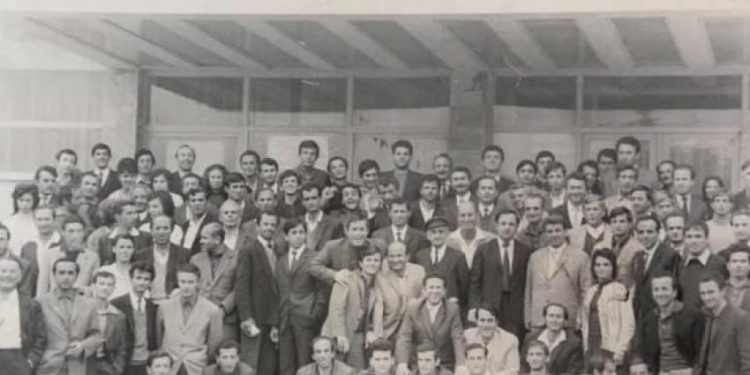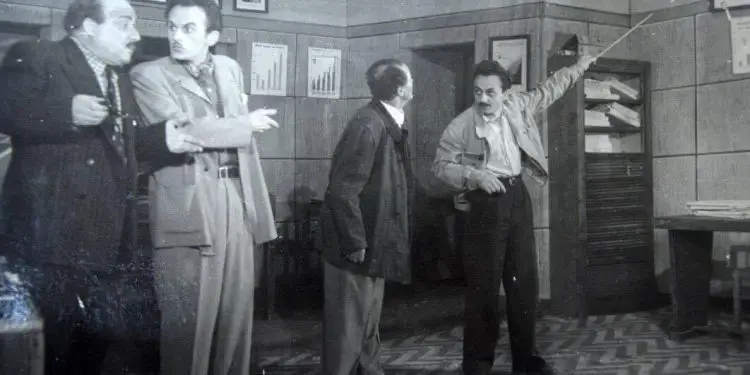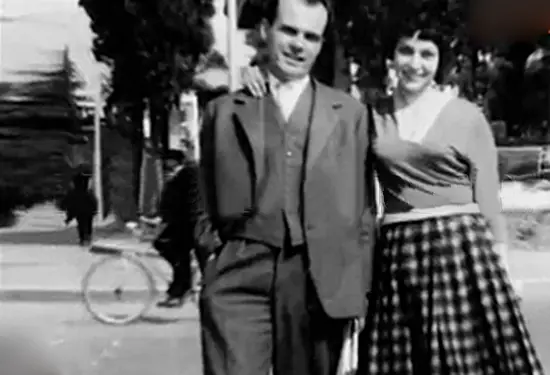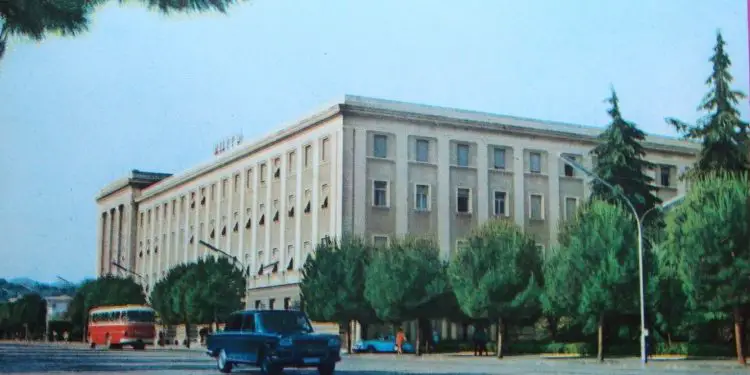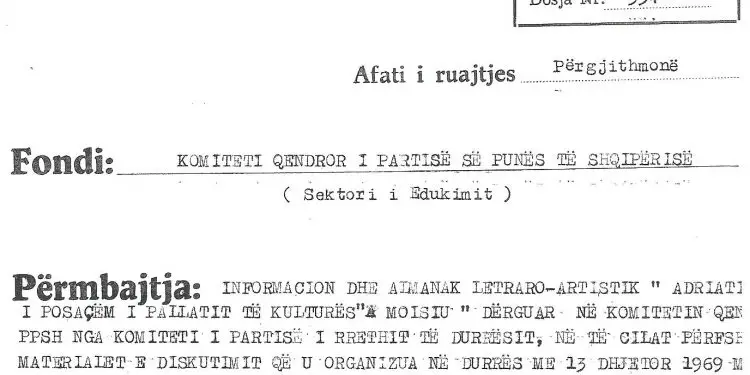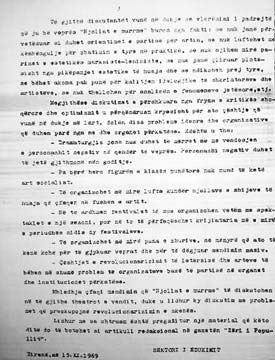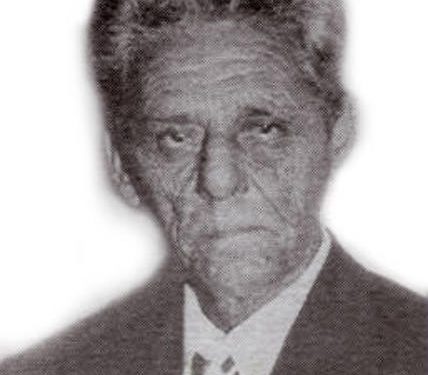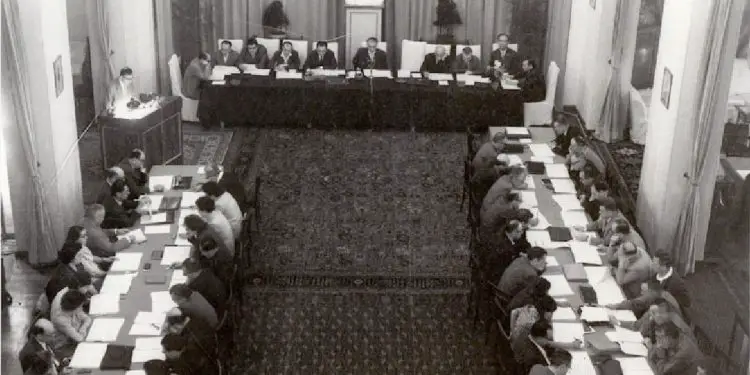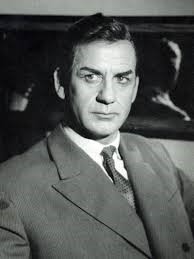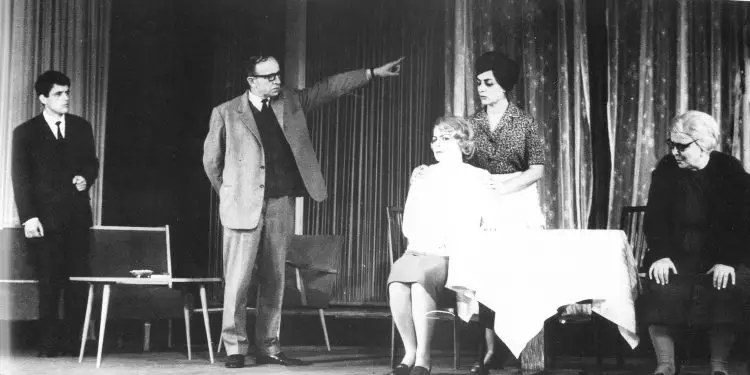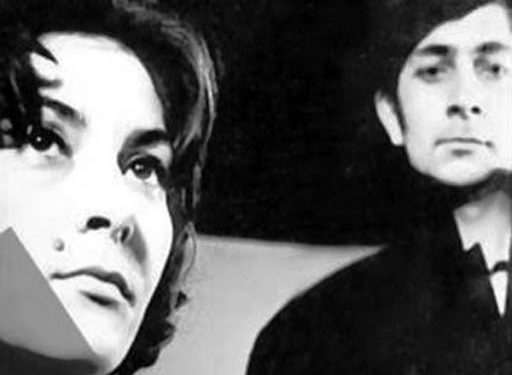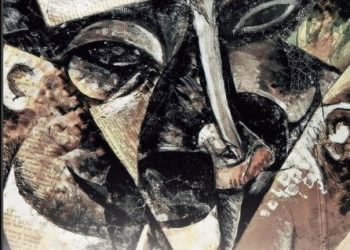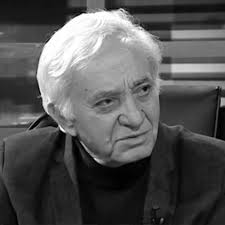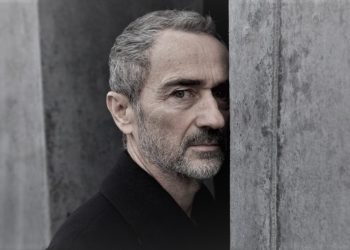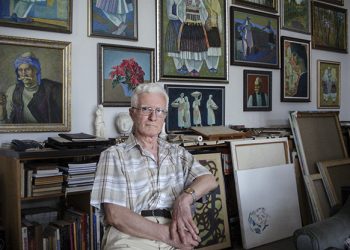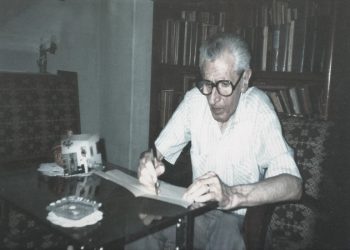Dashnor Kaloçi
Memorie.al publishes the unknown story of the drama “Brown Spots” by playwright Minush Jero, which was first staged by the famous director Mihallaq Luarasi, at the “Andon Zako Çajupi” Theater in Korça where he won the cup of the festival of dramatic theaters and was considered superlative by the then Prime Minister, Mehmet Shehu, but sometime later when she appeared on the stage of the People’s Theater in Tirana, where Enver Hoxha himself was in the lodge, she was criticized and hit by him, as a drama where the working class force did not come out and the micro-bourgeois sentiments dominated ”etc. All the words of Enver Hoxha held at the meeting of the Secretariat of the Central Committee of the ALP, where he ‘crossed’ that part and its authors, calling them ‘stained people’ as well as the discussions of the officials of the Ministry of Education of Culture, such as Miho Gjini, etc., and the actors of the “Aleksandër Moisiu” Theater of the city of Durrës, such as: Spiro Urumi, Nikolin Xhoja, Llazar Ziu, etc., who issued harsh accusations against their colleagues who had performed in that parts, as well as the self-criticism of the playwright Minush Jero and the director, Luarasi, after the ‘lightning bolts’ issued by the main leader of the Party towards their work!
The play “Brown Spots”, by Minush Jero (which was performed on the stage of the Metropolitan Theater in 2016 in Tirana), is one of the most talked about and discussed theatrical plays before the ’90s and almost throughout the period of the communist regime of Enver Hoxha.
“Brown spots”, staged by the well-known director, Mihallaq Luarasi, who appeared as a premiere at the national meeting of professional theaters in the city of Korça in October 1969, was considered extraordinary by the then Prime Minister , Mehmet Shehu and she were awarded the first prize, but when it was given in Tirana some time later, where in the loggia was the main leader of the Party, Enver Hoxha, she was anathema by him.
In one of the meetings of the Secretariat of the Central Committee of the ALP, Enver Hoxha himself dedicated one of the items to the agenda, even analyzing it in detail as if he were a literary critic. This would be just the prologue of a ‘storm’ that Enver Hoxha was undertaking against the people of literature, art and culture, which would culminate with the 11th Song Festival on Radio-Television, where again Enver himself would anathema and would be thrown into an unprecedented attack on its perpetrators.
While these events are already known, Memorie.al is publishing the speech of Enver Hoxha at the meeting of the Secretariat of the Central Committee of the ALP, in 1969, where he struck for the first time “Brown spots” and in the following issues , we will also publish the “crossroads” that was made to this drama by senior officials of the Arts and Culture in the Central Committee of the ALP, officials of the Ministry of Culture, as well as colleagues of Minush Jeros and Mihal Luarasi, in the theater Aleksandër Moisiu ”of the city of Durrës, which we have extracted from secret documents (already declassified for years), which are located in the Central State Archive, the fund of the former Central Committee of the ALP, where like most of the documents of this book, are published in full and without any abbreviations.
Enver Hoxha’s discussion in the Secretariat of the Central Committee for the drama “Brown spots”
COMRADE ENVER HOXHA: In addition to the great successes we have in all directions, we must look straight in the eye and the negative phenomena that still exist in our society, not to underestimate them and deal with them more seriously, because they hinder our progress. When events like the one in Tepelena are confirmed and the party delves into them, analyzes them and sees them better, then it becomes clear how deep such waste is still with us.
We do not diminish the meaning of the concept of “waste” and the dangerousness of their ideological influence, but we must be very careful not to reduce it even in public, so we evaluate them to the necessary extent. We must be clear and seriously understand that, while in the basic organizations of the party even in the mass of communists, where more and where less and sometimes even in an aggravated form, such negative phenomena appear and the main leadership in around and consequently at the base, neglect the fight against them, that is, do not try to analyze and deeply understand the danger that they can bring and to overcome them do not even try to find methods of warfare to achieve purpose, means that below do not properly look at this problem.
It is no coincidence that we say from time to time that fellow first secretaries, or other secretaries of party committees, do not deal sufficiently and seriously with ideological and social problems, which are the key to all problems, although with this I do not want to I say they are not taken at all. This is not a question of division of labor, nor should this work be done in Gjirokastra only by comrade Sevo Tarifa, as secretary of the Party Committee for this district, although the truth is that he himself tries and, from what I see, writes constantly in the district newspaper, prepares taliot for the fight against waste, or Pano Çuka, who deals in the press with problems against the church and religion, but I have not seen an article or a study on ideological issues by comrade Rrapo Dervishi.
Isn’t comrade Rrapo interested in these problems at all?! I cannot say for myself that he is not interested, why as the first secretary of the district Party Committee, he is taken and is aware of everything that happens. He knows what is done, for example, in Lazarat, or in Dropull. What happened to this or that grassroots organization? It is therefore impossible for Comrade Rrapo not to deal with ideological problems, but such a theoretical preoccupation on the scale he deserves, how these should be solved, seems to be lacking on his part and, of course, if there were not, these issues that are too serious cannot be resolved properly.
We have progress as everywhere in this field, so there is no need to become pessimistic, but also to fly without looking deeply and seriously at what looks like us, we are not allowed. I think that theoretically we should study these issues and not only study them, but after discovering them, take active action to solve them, because I have the impression that not enough is actively taken and down there many times there is more many disease of phraseology and forms. To solve a social issue, it is understood that we must necessarily go through certain forms, otherwise it seems to us that we are not okay.
I think that form is created by situation, created by war, created by action. In one case a form can be fruitful, in another it can be excessive and inhibitory, so efforts should be made to find a way to solve the various problems that arise in life and not remain slaves of the form, advising schemes, that it should be done one way or another.
That seems to me, it’s not fair. Last night I saw the theatrical play “Brown Spots” performed by the professional theater group of Korça. I applauded the actors for playing well, especially for the one who played the role of the doctor and for the teacher, but the truth is that I did not like the part at all and it was precisely that it lacked the essential issue. The scene there is dominated by the micro-bourgeoisie, the micro-bourgeois feelings of the doctor, the teacher and their son.
Those who personified the Party and the masses and made morals, came out of the darkness, one came out of the dungeon, talked a little and disappeared, then another came out talking and also left, while the three main characters who played the respective roles very well, were constantly on stage expressing their feelings. their micro-bourgeois. The scene unfolds in such a way that the party, through the other characters, seems to act like the priest, emerges as I said one from a dark corner, releases a joke and runs away, followed by a second and so on, while the micro-bourgeois elements operate actively, follow their path, the doctor even arrives until he leaves a child to die and no one bothers him.
The teacher who is presented as the most advanced by her husband, is dominated by him, she remains a shaky micro-bourgeois to the end, just as she remains to the end a micro-bourgeois and incorrigible man, her husband, the doctor. As for the boy, he does not know what is going on, he followed the youth or continued on the wrong path by dancing twist. Where is the influence of party work in the family in this drama? It was only when the doctor’s son attacked Natasha to catch him that a loud noise was heard, the young men came out of the corner shouting at him, and he left.
The audience on this occasion immediately applauded that he felt the emptiness, expected and wanted such a thing. At the very end of all this work, the teacher came out and declared that we would uproot these thorns from our society, but that was and remained only a slogan issued by an element with a pronounced micro-bourgeois waste. At a time when we are revolutionizing the school, the author conveys the view as if in our school the micro-bourgeois element rules and establishes.
This emerges from the discussion and the decision taken in the Pedagogical Council for the revolutionary student, who is expelled from school. At first, his case is defended by a shaky teacher who is under the influence of her doctor husband, with strong micro-bourgeois feelings.
At the end of the discussion, seven of the professors are for the unjust punishment of the student, while six are for him. The micro-bourgeois elements, starting with the school principal, are all attackers. When colleagues asked the teacher, the doctor’s wife, who had previously defended the student’s case, what she thought, how she would vote, she did not take a stand and replied that she abstained.
From the whole development of the event, it turns out that our school is in the hands of the micro-bourgeoisie, when in fact it is not so. Analyzing in this prism the content of this theatrical play, in my opinion, it does not deserve the first prize, awarding the prize is wrong, even very offensive to our intelligence.
The teachers and doctors there are offended, our school is offended, the workers are offended. The worker who is a member of the parents’ council of this school, when he gets up to speak, does not say anything important, except to warn the doctor why his son should join some bad people, instead of being heard on stage strong voice of workers.
This drama does not happen, on the contrary, it is dominated by the doctor with his distorted views, he even goes so far as to say that “these” are forgetting the good I did. The analysis of the feelings that the author calls “Brown spots”, in the drama is done well. These performances should be noted, but at the same time the great strength of the party should be brought out against them, which is not even mentioned once.
This force had to be seen clearly and everywhere and not the scouts, like the priest. The party had to act in such a way that the intellectual elements with pronounced micro-bourgeois waste were gradually corrected, to go on the right path of the people and the party and not to be allowed to continue to act in their views.
In the drama should also appear the great strength of the working class. This and the party had to act there, their educational work had to positively influence the negative elements. In drama, then, there is no action on the positive side. The views that are treated have prompted the author to define the form, as he thought. So, she is weak in form. But what matters, in my opinion, is the issue of content. The spectators, after seeing this part, come out unexplained, why the doctor and his teacher wife continue to keep the cabbages in their heads, they do not fix it.
The doctor’s wife, the teacher, occasionally comes out against the husband, though she continues to be under the influence of his views. Then it is acceptable for a woman to dominate our school because she is beautiful and has a husband with high positions, so the teachers are afraid of her.
Our reality is not like that, it cannot be presented this way. Or let’s take the issue of youth education in drama. The school youth only passed once with drums on stage, then throughout the course of the event, it comes out only through the mouth of the uneducated son of the doctor and teacher.
The micro-bourgeois elements also make high philosophy into drama. Jokes are hard to remember with a listener, so it should be read that they may be of good and fair content, but I think they are not for the masses of the people.
My impression, however, is that the jokes were good, hit, but the mass of the people have nothing left of them. How to act against the micro-bourgeois elements in this part, only with jokes?
I think not only with jokes, but primarily with actions, with actions, with war, otherwise it does not serve the purpose. It is not enough just to raise the issue, we must try in the first place to understand them ideologically, but at the same time it is necessary to act, action for the solution to the end of every problem.
There are issues that are quite well understood ideologically. The other knows that if you insult a communist brigadier, when he is convinced that this is honest, he does not accept it and takes a stand. Yes, this is not enough, so he should not wait until the meeting of the organization to report to him, he is asking for the measures to be collected immediately, after he has made efforts to find what he has slandered, so that he can come forward. to the people and in front of the collective to force the slanderer to say what he said about the brigadier, then, after being rags by everyone, to be warned that, if he was heard again for things of this nature, he would be sent to the Prosecutor’s Office. So before attempting to do any more slander again, it will be well thought out.
By acting the masses, the party, thus the negative element will be curbed and educated. This is how these things should be resolved, to act immediately and not to wait, saying let ‘s say once to the secretary of the organization, then wait and see. These are problems that of course with a day, or with a saying are not solved. Even with anger, these things are not done, so it is always required calmness and care and to constantly stay in their head, to fight immediately as soon as they appear, otherwise they thicken and bring us harm. I am of the opinion that after this analysis, the comrades we sent to the Tepelena district acted correctly.
It is now up to those who erred in this matter and were dismissed from their duties to find some work, that they should not be dismissed. They really did make a mistake, but I believe they understood the mistake now, perhaps theoretically not yet to the right degree, but they felt it, so take care to educate them, help them correct the mistakes, and correct them. NOTE: The material was recorded by Pandi Dini and edited by Sadik Myftiu and Vaske Diraoshi. While the parts with the speech of Comrade Enver were edited by Haxhi Kroi. Comrade Hysni’s report on the third item of the agenda, after being edited by the tape recorder and edited, was seen by the author himself./Memorie.al
HEAD OF GENERAL SECTOR OF THE CENTRAL COMMITTEE
Sadik Mufti
Continues in the next issue




